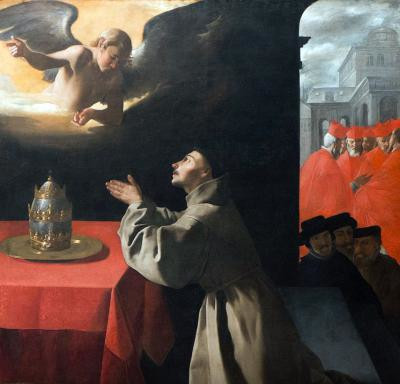
Saint of the Day for 15 July: Saint Bonaventure
The humble Doctor of the Church with the mission to enlighten minds and hearts
Name
Saint Bonaventure
Title
Bishop and Doctor of the Church
Birth
1221, Bagnoregio, Lazio
Death
14 July 1274, Lióne, France
Recurrence
15 July
Martyrology
2004 edition
Canonisation
14 April 1482, Rome, Pope Sixtus IV
Prayer
O Beloved Heart of Jesus, why hast Thou made Thyself torn open by the lance, if not to show me the excess of Thy love and to be the habitation of my soul? And when shall I enter Thee and solemnly protest: This is my eternal rest; here I will dwell because I have chosen this dwelling place for myself? My Jesus, introduce this soul of mine as soon as possible through the wound of the open side into the secret of your most lovable and most loving Heart, so that it may be purified, beautified and totally inflamed in your charity; so that, forgetting earthly solicitudes, it may think only of loving you, my crucified God.
Patron of
Bagnoregio, Belmonte Calabro, Montelupo Albese
Roman Martyrology
In Lyon, France, the deposition of Saint Bonaventure, Cardinal and Bishop of Albano, Confessor and Doctor of the Church, of the Order of Friars Minor, famous for his doctrine and holiness of life. His feast day, however, is celebrated on the previous day.
The Saint and Mission
St Bonaventure was a great theologian and mystic who lived his life with a spirit of mission rooted in love for God and humanity. His mission was to spread the truth and wisdom of the Gospel, enlightening people’s minds and hearts. As a Franciscan friar, St Bonaventure was dedicated to poverty, humility and love for others. He transmitted the teachings of St Francis of Assisi, putting brotherly love and care for the most needy into practice. In his theological work, St Bonaventure sought to combine reason with faith, emphasising the importance of a deep intellectuality and spirituality. His mission was to show that the search for truth and the search for God are not at odds, but complement each other. May the example of St Bonaventure inspire us to be witnesses of God’s truth and love, spreading hope, compassion and wisdom in every sphere of our lives and in every place where we are called to be present.
The Saint and Mercy
St Bonaventure is considered a saint known for his commitment to the Work of Spiritual Mercy of teaching the ignorant and counselling the doubtful. He was a learned, wise and good man who dedicated his life to serving others through teaching and spiritual guidance. As minister general of the Order of Friars Minor, St Bonaventure promoted education and instruction within the order. He encouraged the friars to dedicate themselves to teaching in order to spread knowledge and wisdom among the common people. His humility allowed him to approach the ignorant with kindness and compassion, offering them spiritual teachings and educating them in the faith. St Bonaventure was also a much sought-after counsellor. Many people turned to him for spiritual advice and answers to their questions and doubts about the faith. Thanks to his erudition and deep understanding of theology, he was able to offer wise advice and guide people towards a greater understanding of their faith. Therefore, St. Bonaventure is remembered as a saint who exercised the Work of Spiritual Mercy of teaching the ignorant and advising the doubtful. His commitment to spreading knowledge and wisdom, combined with his humility and goodness, rendered a great service to the Church and to those who sought his guidance.
Hagiography
In the year 1221 St Bonaventure was born in Bagnoregio (Lazio), and was called John at the baptismal font. Having fallen seriously ill at the age of four, his mother recommended him to St Francis of Assisi, who was passing through, promising to offer him to the Lord in the Order of Friars Minor if he regained his health. St Francis prayed for him and when he heard that he had recovered, he exclaimed: ‘O good fortune’ and from then on John was called Bonaventure. Growing in years, in 1242 he joined the followers of the poverello of Assisi, where in a short time he made admirable progress in virtue and science. Having made his profession, he was sent to the University of Paris, to the school of the learned Father Ales. The progress he made in his studies was such that…
